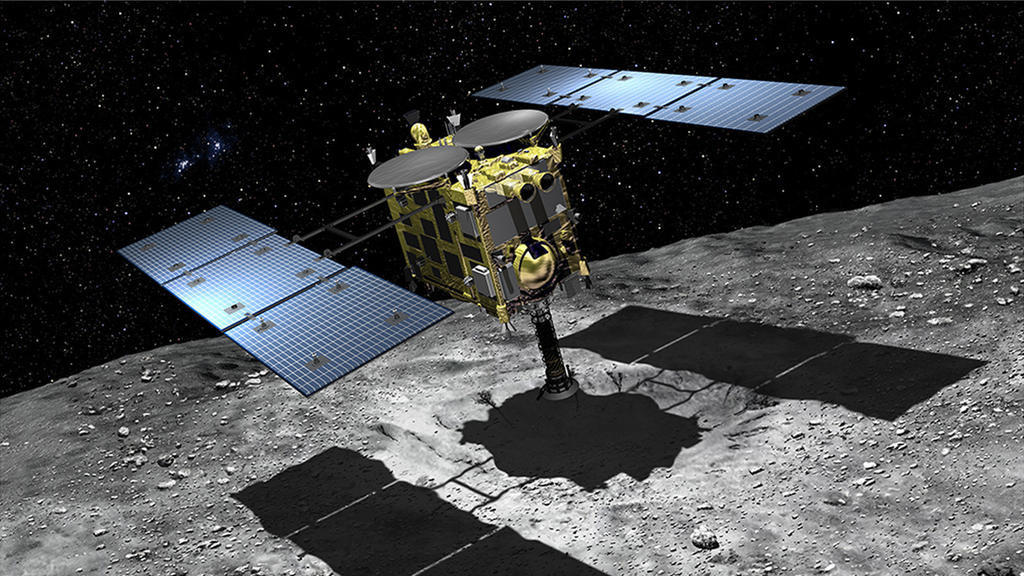はやぶさ 2 のタッチダウン成功について
2019 年 2 月 22 日

2019 年 2 月 22 日,宇宙航空研究開発機構 (JAXA) / 宇宙科学研究所 (ISAS) は,小惑星「りゅうぐう」において小惑星探査機「はやぶさ 2」が弾丸を発射し,サンプルコンテナを閉鎖,試料の採取に成功し た模様であると発表しました.
不断の努力のもと,有機物に富んだ惑星物質を採取し,地球に持ち帰るべく努力を続けるプロジェクトマネージャーをはじめとする関係各位,とりわけエンジニアの皆様に敬意を表するとともに,残されたミッションをやり遂げ,探査機が無事に地球に帰還するよう引き続き願っています.
私たち,The Phesant Memorial Laboratory (PML) は,「はやぶさ 2」ミッションにおいてJAXA/ISIS との連携協定の元,回収試料の初期総合物質解析を目的としたフェーズ 2 キュレーションを担当します.生命の起源となる物質の特徴と形成過程を理解するための総合物質分析の実施によって,ミッションに貢献できればこんなに嬉しいことはありません. そのため,必要な分析環境の整備,技術開発,分析プロトコルの策定,解析リハーサル,そして成果公開のためのシステム開発を進めています.
惑星探査ミッションは,研究のフロンティアであると同時に,次世代の研究者が参画し成長する最高の機会です.学生の皆さん,我々と一緒に小惑星物質の分析を実施し,分析技術を獲得すると同時に,太陽系の物質進化を理解し,生命物質の起源解明に挑戦しませんか.
PMLでは意欲ある学生の受け入れを行っています.充実した学生支援プログラムを持つ5年一貫制大学院において,博士課程研究活動を通じて幅広い物質科学を修学し,次代の太陽系物質科学を担う研究者を是非目指してください.
中村 栄三 (eizonak@misasa.okayama-u.ac.jp)
Remarks for touch down by Hayabusa 2
2019, Feb. 22

On February 22, 2019, the Japan Aerospace Exploration Agency (JAXA) / Institute of Space and Astronautical Science (ISAS) announced that the asteroid explorer "Hayabusa 2" launched a bullet in the asteroid "Ruugou" and closed the sample container which concluded in and successful collection!
With constant efforts, we honored everyone who participates in this mission, including project managers who collect organic matter-rich planetary materials and continue to make efforts to bring them back to the earth and in particular, to accomplish the remaining mission to be a complete success, we wish the spacecraft to have a safe return to home.
We, The Phesant Memorial Laboratory (PML) are in charge of the curation phase with the aim of initial comprehensive material analysis from the recovered samples by “Hayabusa 2” mission under the cooperation agreement with JAXA / ISIS. Don’t you think it is a very pleasant experience if you can contribute to the mission by implementing a comprehensive material analysis to understand the characteristics and formation process of this material which becomes the origin of life. Therefore, it is necessary to develop the necessary analysis environment, develop the technology, analysis analogs and development of systems for publication of these results.
The planetary exploration mission is the frontier of research and at the same time it is the best opportunity for next-generation researchers to participate and grow. Students will try to analyze asteroid materials with us, acquire analytical techniques, understand planetary material evolution in the solar system and try to elucidate the origin of the biological matter.
PML accepts motivated students at the 5-year PhD integrated program by the graduate school with a fulfilling student support program. You will be able to study a wide range of materials science through doctoral course research activities and aim for researchers who are responsible for the next generation of solar system material science.
Eizo Nakamura (eizonak@misasa.okayama-u.ac.jp)
Image credits to: JAXA